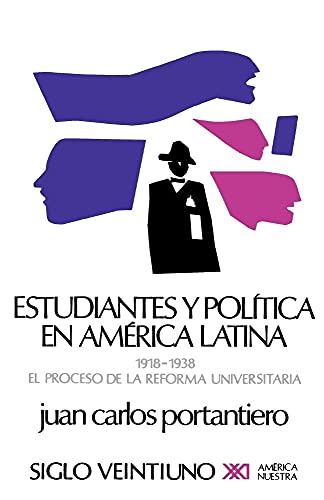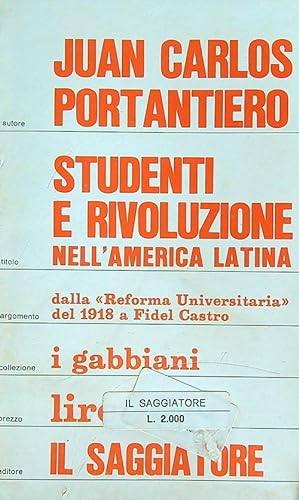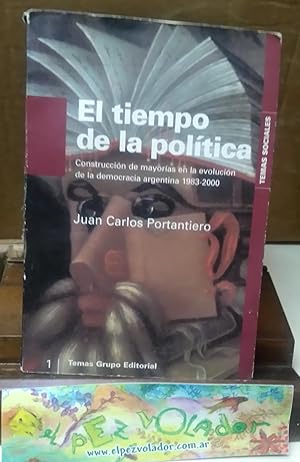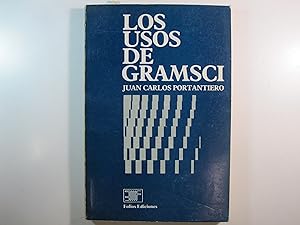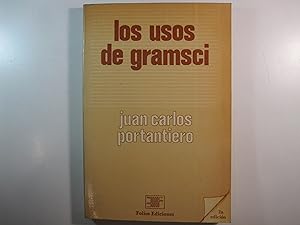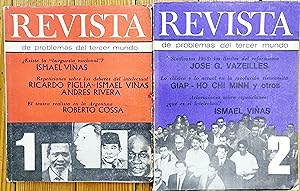juan carlos portantiero (23 Ergebnisse)
FeedbackSuchfilter
Produktart
- Alle Product Types
- Bücher (20)
- Magazine & Zeitschriften (3)
- Comics (Keine weiteren Ergebnisse entsprechen dieser Verfeinerung)
- Noten (Keine weiteren Ergebnisse entsprechen dieser Verfeinerung)
- Kunst, Grafik & Poster (Keine weiteren Ergebnisse entsprechen dieser Verfeinerung)
- Fotografien (Keine weiteren Ergebnisse entsprechen dieser Verfeinerung)
- Karten (Keine weiteren Ergebnisse entsprechen dieser Verfeinerung)
- Manuskripte & Papierantiquitäten (Keine weiteren Ergebnisse entsprechen dieser Verfeinerung)
Zustand Mehr dazu
Einband
- alle Einbände
- Hardcover (Keine weiteren Ergebnisse entsprechen dieser Verfeinerung)
- Softcover (14)
Weitere Eigenschaften
- Erstausgabe (Keine weiteren Ergebnisse entsprechen dieser Verfeinerung)
- Signiert (Keine weiteren Ergebnisse entsprechen dieser Verfeinerung)
- Schutzumschlag (6)
- Angebotsfoto (17)
Sprache (2)
Gratisversand
Land des Verkäufers
Verkäuferbewertung
-
Studenti e rivoluzione nell'America Latina
Verlag: Il Saggiatore, MILANO, 1971
ISBN 13: 2560223332626
Anbieter: Biblioteca di Babele, Tarquinia, VT, Italien
EUR 6,00
Währung umrechnenEUR 12,00 für den Versand von Italien nach DeutschlandAnzahl: 1 verfügbar
In den WarenkorbZustand: DISCRETO USATO. IED. I Gabbiani ITALIANO Brossura pocket, vol. 85 della collana, trad. di M. Ravoni e G. Guadalupi, copertina segnata da sfregamento al bordo e canaletto, pigmento alterato dalla luce, da polveri e aloni di umido da scaffale, fogli velati da ossidazione intensa ai margini e ruggine ai tagli. N. pag. 287.
-
Estudiantes y Politica En America Latina
Verlag: SIGLO XXI EDITORES, S. A. DE C. V., 1978
ISBN 10: 968230296X ISBN 13: 9789682302961
Sprache: Spanisch
Anbieter: Buchpark, Trebbin, Deutschland
EUR 18,84
Währung umrechnenKostenlos für den Versand innerhalb von/der DeutschlandAnzahl: 1 verfügbar
In den WarenkorbZustand: Sehr gut. Zustand: Sehr gut | Sprache: Spanisch | Produktart: Bücher.
-
Estudiantes y Politica En America Latina
Verlag: SIGLO XXI EDITORES, S. A. DE C. V., 1978
ISBN 10: 968230296X ISBN 13: 9789682302961
Sprache: Spanisch
Anbieter: moluna, Greven, Deutschland
EUR 28,30
Währung umrechnenKostenlos für den Versand innerhalb von/der DeutschlandAnzahl: Mehr als 20 verfügbar
In den WarenkorbZustand: New.
-
Estudiantes y Politica En America Latina (Seccion de Obras de Historia) (Spanish Edition)
Anbieter: Ria Christie Collections, Uxbridge, Vereinigtes Königreich
EUR 23,48
Währung umrechnenEUR 5,72 für den Versand von Vereinigtes Königreich nach DeutschlandAnzahl: Mehr als 20 verfügbar
In den WarenkorbZustand: New. In.
-
Studenti e rivoluzione nell'America latina
Verlag: Il Saggiatore, 1971
Anbieter: Librodifaccia, Alessandria, AL, Italien
EUR 9,00
Währung umrechnenEUR 15,90 für den Versand von Italien nach DeutschlandAnzahl: 4 verfügbar
In den WarenkorbZustand: Buone. italiano Condizioni dell'esterno: Discrete con difetti, bruniture Condizioni dell'interno: Discrete con Difetti, bruniture.
-
Estudio sobre los origenes del peronismo/1
Verlag: Sigloveintuno editores
ISBN 13: 0089622864245
Anbieter: SoferBooks, Barcelona, B, Spanien
EUR 16,99
Währung umrechnenEUR 8,99 für den Versand von Spanien nach DeutschlandAnzahl: 1 verfügbar
In den Warenkorbblanda. Zustand: Buen estado Minimamente dañado. Zustand des Schutzumschlags: Buen Estado.
-
La sociologia clasica durkheim y weber
Verlag: Centro editor de america latina
ISBN 10: 9502503546 ISBN 13: 9789502503547
Anbieter: SoferBooks, Barcelona, B, Spanien
EUR 23,99
Währung umrechnenEUR 8,99 für den Versand von Spanien nach DeutschlandAnzahl: 1 verfügbar
In den WarenkorbBlanda. Zustand: Buen Estado. Zustand des Schutzumschlags: Buen Estado.
-
la sociologia clasica : durkheim y weber
Verlag: anagrama, 1977
Sprache: Spanisch
Anbieter: Libros de papel, Madrid, M, Spanien
EUR 6,00
Währung umrechnenEUR 32,00 für den Versand von Spanien nach DeutschlandAnzahl: 1 verfügbar
In den WarenkorbEncuadernación de tapa blanda. Zustand: Muy Bien. 127 p.
-
ESTUDIANTES Y POLÍTICA EN AMÉRICA LATINA. 1918-1938. El Proceso de la Reforma Universitaria.
Verlag: México: Siglo XXI Editores, 1978., 1978
Anbieter: Librería Antonio Castro, SEVILLA, SE, Spanien
EUR 16,00
Währung umrechnenEUR 18,50 für den Versand von Spanien nach DeutschlandAnzahl: 1 verfügbar
In den Warenkorb4to. 461 pp. Encuadernación editorial. Buen estado.
-
Realismo y realidad en la narrativa argentina.
Verlag: Bs.As., Procyón, 1961., 1961
Anbieter: AQUILANTI. Libros Antiguos & Modernos (A.L.A.D.A), Ciudad De Buenos Aires, CABA, Argentinien
Verbandsmitglied: ALADA
EUR 21,95
Währung umrechnenEUR 15,34 für den Versand von Argentinien nach DeutschlandAnzahl: 1 verfügbar
In den Warenkorb129 páginas. 8vo., rústica.
-
El Tiempo De La Política
Verlag: Temas, Argentina, 2000
Sprache: Spanisch
Anbieter: Librería El Pez Volador, Rosario, SF, Argentinien
EUR 15,00
Währung umrechnenEUR 31,53 für den Versand von Argentinien nach DeutschlandAnzahl: 1 verfügbar
In den WarenkorbEncuadernación de tapa blanda. Zustand: Regular Aceptable. 175 pp, con rastros de humedad.
-
EUR 38,00
Währung umrechnenEUR 8,99 für den Versand von Spanien nach DeutschlandAnzahl: 1 verfügbar
In den WarenkorbZustand: New. Zustand des Schutzumschlags: Nuevo.
-
Studenti e rivoluzione nell'America Latina.
Erscheinungsdatum: 1971
Anbieter: Libreria Piani, Monte San Pietro, BO, Italien
EUR 20,00
Währung umrechnenEUR 15,00 für den Versand von Italien nach DeutschlandAnzahl: 1 verfügbar
In den WarenkorbMilano, il Saggiatore, 1971, 16mo brossura, pp. 287.
-
Estudios sobre los orígenes del periodismo, tomo 1
Verlag: Siglo Veintiuno, Buenos Aires, 1972
Anbieter: Librería Alonso Quijano, Alcobendas, M, Spanien
EUR 34,90
Währung umrechnenEUR 40,00 für den Versand von Spanien nach DeutschlandAnzahl: 1 verfügbar
In den WarenkorbHistoria () Siglo Veintiuno. Encuadernación en tapa Blanda. Murmis, Miguel ; Portantiero, Juan Carlos. 18 cm. Estudios sobre los orígenes del periodismo, tomo 1Tapa deslucida.Tapa ilustrada. Pags.129.Volúmenes. Libro usado.
-
Studenti e rivoluzione nell'America Latina.
Erscheinungsdatum: 1971
Anbieter: Libreria Piani, Monte San Pietro, BO, Italien
EUR 28,00
Währung umrechnenEUR 15,00 für den Versand von Italien nach DeutschlandAnzahl: 1 verfügbar
In den WarenkorbMilano, Saggiatore, 1971, 16mo brossura editoriale, pp. 288.
-
La sociologia clasica: Durkheim y Weber
Verlag: Centro Editor de America Latina
Anbieter: SoferBooks, Barcelona, B, Spanien
EUR 55,00
Währung umrechnenEUR 8,99 für den Versand von Spanien nach DeutschlandAnzahl: 1 verfügbar
In den WarenkorbRustica. Zustand: Muy Bueno. Zustand des Schutzumschlags: Usado.
-
La sociologia clasica: Durkheim y Weber
Verlag: Centro Editor de America Latina
ISBN 10: 9502503546 ISBN 13: 9789502503547
Anbieter: SoferBooks, Barcelona, B, Spanien
EUR 55,00
Währung umrechnenEUR 8,99 für den Versand von Spanien nach DeutschlandAnzahl: 1 verfügbar
In den WarenkorbRustica. Zustand: Muy Bueno. Zustand des Schutzumschlags: Usado.
-
EUR 46,00
Währung umrechnenEUR 19,00 für den Versand von Spanien nach DeutschlandAnzahl: 1 verfügbar
In den Warenkorb1983 Folios ediciones 2ª edic. Col. El tiempo de la política. 197 pp. 20x14 cm. Enc. en rústica edit. Para ver o recibir fotografías de los libros puede ir a nuestra web o solicitarlas.
-
EUR 46,00
Währung umrechnenEUR 19,00 für den Versand von Spanien nach DeutschlandAnzahl: 1 verfügbar
In den Warenkorb1982 Folios ediciones 2ª edic. Col. El tiempo de la política. 197 pp. 20x14 cm. Enc. en rústica edit. Para ver o recibir fotografías de los libros puede ir a nuestra web o solicitarlas.
-
EUR 83,00
Währung umrechnenEUR 8,99 für den Versand von Spanien nach DeutschlandAnzahl: 1 verfügbar
In den WarenkorbRustica. Zustand: Bueno. Zustand des Schutzumschlags: Usado.
-
Revista de Problemas del Tercer Mundo
Verlag: Buenos Aires, 1968
Anbieter: Chaco 4ever Books, Montevideo, MO, Uruguay
Magazin / Zeitschrift
EUR 351,13
Währung umrechnenEUR 26,85 für den Versand von Uruguay nach DeutschlandAnzahl: 1 verfügbar
In den WarenkorbEncuadernación de tapa blanda. Zustand: Muy bien. In-4. Apr 1968 - Dic 1968. (Complete set). Wrappers. The Third World Problems Magazine, had only two issues that were published in 1968. Its editorial board was made up of several of the main intellectuals of the "new Argentine left" among which stand out: Ricardo Piglia, Roberto Cossa , Juan Carlos Portantiero, Andrés Rivera, Jorge Rivera, Ismael Viñas, Rodolfo Walsh, David Viñas, León Rozitchner, Francisco Urondo, and Raúl Sciarreta. In its two issues, the magazine sought to elucidate novel ways of addressing phenomena of Argentine culture and politics such as Peronism, the political and ideological modes of domination, the discussion about the role of intellectuals, and social transformations in the composition of the classes. Tarcus p59. W15.
-
NUEVA POLÍTICA Publicación del Instituto de Estudios Argentinos I.D.E.A.
Verlag: Buenos Aires Publicación del Instituto de Estudios Argentinos I.D.E.A., 1965
Anbieter: Chaco 4ever Books, Montevideo, MO, Uruguay
Magazin / Zeitschrift
EUR 438,92
Währung umrechnenEUR 26,85 für den Versand von Uruguay nach DeutschlandAnzahl: 1 verfügbar
In den WarenkorbEncuadernación de tapa blanda. Zustand: Muy bien. In-8. #1 Dic 1965. (All published). Wrappers. Collaborators : Juan Carlos Portantiero, Ismael Viñas, Rodolfo Walsh, Susana Fiorito, José Vazeilles, Rafael Filippelli. Traducción de Hamza Alavi. In December 1965, the first issue - which would also be the only one - of Nueva Politica appeared in Buenos Aires, a publication that presented itself as "a magazine of coincidences from a nationalist, revolutionary and socialist perspective." In the Editorial Board, the dominant presence of Ismael Viñas was noticed: several of the members - his brother David, Noé Jitrik, León Rozitchner - who had accompanied Contorno years ago and others were members of the National Liberation Movement of which Viñas was recognized as main leader. But there were other components, such as Juan Carlos Portantiero and Eduardo Jozami, dissidents from the Communist Party, and also a writer who could then be described as independent: Rodolfo Walsh.That the magazine was not an isolated phenomenon is evidenced by other publications in those last months of 1965. The sixth issue of the Armored Rose which expressed a significant dissidence of communist intellectuals headed by José Luis Mangieri, Alberto Brocato, Juan Gelman and Andrés Rivera published "Socialism and the man in Cuba", the letter sent by Che Guevara to the director of the magazine Marcha de Montevideo that would become the ethical ideology of the new left, but also the "Bases for a revolutionary cultural policy" of John William Cooke, who after several years of stay in Havana, exercised an important influence among many Peronist militants, stimulating openness to left thinking. In Córdoba, José Aricó had directed Pasado y Presente for two years, another publication of those excluded from the CP, open both to theoretical debate on "the ways of the revolution" and to the new developments of a Marxism that did not exclude dialogue with the structuralism or psychoanalysis. But not only are publications flourishing, but militant groups are emerging. At the University (and even in certain union sectors) the new left, sometimes linked to groups of revolutionary Peronism, began to have a presence. However, in order not to exaggerate its real political influence, it is convenient to turn to another publication, Literatura y Revolución, whose initial issue appeared in October of the same year, directed by Sergio Camarda and Ricardo Piglia. In Argentina, in 1965, leftist intellectuals are harmless. Scattered, from time to time confronted in rhetorical disputes, sweetly fond of our chapels, we exercise careful ineffectiveness. We do show an admirable goodwill: we sign manifestos, we travel to socialist countries, our books are brave, "Piglia declared in the editorial, to conclude by pointing out among so many limitations the most difficult to accept:" We suffer from the justified indifference of the only class to the one that we entrust our liberation. They are there, alien like the forests . Tarcus p57. F4.
-
LA CIUDAD FUTURA. Revista de cultura socialista
Verlag: Buenos Aires Altuna Impresores, 1986
Anbieter: Chaco 4ever Books, Montevideo, MO, Uruguay
Magazin / Zeitschrift
EUR 2.194,58
Währung umrechnenEUR 26,85 für den Versand von Uruguay nach DeutschlandAnzahl: 1 verfügbar
In den WarenkorbEncuadernación de tapa blanda. Zustand: Muy bien. In-8 & Folio. #1 Aug 1986 - #56 winter 2004. (Complete set). Wrappers. Collaborators : Juan Manuel Abal Medina, Carlos Ábalo, Mario Albornoz, Álvaro Abós, Gerardo Aboy Carlés, Jeremy Adelman, Gerardo Adrogué, Marcos Aguinis, Raúl Alfonsín, Héctor Alimonada, Carlos Altamirano, Leopoldo Allub, Ana María Amado, Waldo Ansaldi, José Aricó, Leonor Arfuch, Rodrigo Arocena, Javier Artigues, Alejandro Martín Artopoulus, Antonella Attilli, Carlos Auyero, Luis Aznar, Alicia Azubel, Mario Baccianini, Jorge Balán, Benjamín Barber, Héctor Barbotta, Roger Bartra, José M. Benegas, Hugo E. Biagini, Alejandro Blanco, Arnaldo Bocco, Andrea Boitani, Pablo Bonaldi, Carlos Bonantini, Alejandro Bonvecchi, Giancarlo Bosetti, Fabián Bosoer, Natalio Botana, Alberto Bozza, Alfredo Bozza, Cecilia Braslavsky, María Braun, Héctor Alfredo Bravo, Pedro Brieger, Carlos Brocato, Gustavo Brufman, Christian Buchrucker, Sergio Bufano, Mario E. Burkun, Eduardo S. Bustelo Graffigna, Pablo Bustos, Gerardo Caetano, Fernando Calderón, María Caldelari, Fabián C. Calle, Héctor Aguilar Camín, Adolfo Canitrot, Carlos María Cárcova, Elisa Carrió, José Armando Caro Figueroa, Antonio Cartañá, Jorge Castañeda, Franco Castiglioni, Nicolás Casullo, Alejandro Cattaruzza, José Luis Cebrián, Oscar Cetrángolo, Isidoro Cheresky, Sergio Chejfec, Fernando Claudín, Federico Coen, Oscar Colman, Francisco Colom González, Pedro Conrado Sonderéguer, Carlos R. Constela, José Luis Coraggio, Arnaldo Córdova, Zita Coronato Montes de Oca, Carlos Nelson Coutinho, Horacio Crespo, Claudia Decándido, Liliana De Riz, Oscar Del Barco, Francisco Delich, Verónica Devalle, Vicente Di Cione, Torcuato Di Tella, Beatriz Sarlo, Marcelo Lozada, Hugo Vezzetti, Hector Leis, Among others. In the mid-1980s, upon their return from Mexican exile, José Aricó and Juan Carlos Portantiero proposed, along with other intellectuals with whom they formed the Club of socialist culture a reassessment of the link between socialism and democracy and, consequently, a rereading of the history and traditions of the Argentine left. The quoted words illuminate the meaning of the commitment they made in the 1980s: renew the traditions of an Argentine left that they considered stagnant. The assertion that democracy was a constitutive part of socialism opened itself to criticism from the bets of the revolutionary left; and also to the rereading and recovery of the socialist tradition of the beginning of the 20th century and of the "old Socialist Party", a reinterpretation that linked to the commitment to found a "democratic and modern left". La Ciudad Futura It discusses the revision of the link between socialism and democracy; it gives an account of their criticism to the positions of the revolutionary left; and reconstructs their reading of the socialist tradition of the old Partido Socialista, to which proposses to link with the founding of a democratic left .In his search for building a critical piece of land and for the proximity of many of the intellectuals who participated in it with the government of Alfonsín is that La Ciudad Futura was forced to affirm from the outset moment that «we are not Alfonsinists, nor radicals, nor social democrats. We are simply socialists who have a shared conviction. Yeah Although they emphasized a point of convergence with the government, they sought, as any magazine of intellectuals, maintain an autonomous look. However, According to Beatriz Sarlo, this did not seem like an easy undertaking. Tarcus p77 only quotes 54 issues. CodZ.



